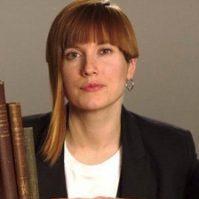This post is part of the Meet the ETCL Team series, which introduces the wonderful people who work in the lab. In this second part of the series, we’re catching up with people who used to work with us.
 If you’re reading this, go join a lab! This is the advice of Dr. Constance Crompton, a former ETCL team member whom we caught up with recently at Online Engagement Within and Beyond the University, Constance’s last event as Honorary Resident Wikipedian (HRW).
If you’re reading this, go join a lab! This is the advice of Dr. Constance Crompton, a former ETCL team member whom we caught up with recently at Online Engagement Within and Beyond the University, Constance’s last event as Honorary Resident Wikipedian (HRW).
Constance was our HRW from 2017–2019, leading Wikipedia edit-a-thons and inspiring us to bridge the academic and non-academic communities by contributing our knowledge to Wikipedia and other Wikimedia projects.
She first joined us in 2011, though, as a postdoctoral researcher in Textual Studies and Digital Humanities, after attending DHSI for a few years, and with a PhD in Communication and Culture from York University in hand. Her main project was developing A Social Edition of the Devonshire MS (BL Add. MS 17492), a socially edited Wikibooks edition of a sixteenth-century verse miscellany that was itself socially edited and compiled. The ETCL team had been working on the project for a few years when Constance joined us to focus on transforming the TEI markup to Wikicode, in collaboration with the project’s RAs and editorial advisory board.
After completing her postdoc in 2012, Constance headed to the University of British Columbia’s Okanagan Campus, where she was an Assistant Professor of Digital Humanities (DH), teaching DH, English, and Cultural Studies. She also founded UBC Okanagan’s Humanities Data Lab in the Faculty of Creative and Critical Studies, which has since transformed into the AMP Lab under the direction of Karis Shearer.
Now, Constance is an Assistant Professor of Communication and Canada Research Chair in Digital Humanities at the University of Ottawa, where she directs the Humanities + Data Lab. She also co-directs the Lesbian and Gay Liberation in Canada project with Michelle Schwartz (Ryerson University).
Some of Constance’s favourite memories of working in the lab include feeling nervous about meeting everyone (then making friends with colleagues like Laura Estill), seeing the Brown Bag Lunches and DH Drinks programs off the ground, and seeing the lab growing during her time here.
When we asked her how working in the lab had shaped her path the most, Constance noted that the experience showed her what “lab life” could be, and she brought the collegiality and emphasis on community building into the Humanities Data Lab and into her work at the University of Ottawa, as well as her experience with lab-based teaching and collaborative problem solving.
When Constance is not encoding texts, teaching, or otherwise at work, she spends her time stacking blocks with her two-year-old and birdwatching, a hobby inspired by her interest in the history of science and Victorian ornithology. She can often be found—including at DHSI—standing in bushes with binoculars, looking for Baltimore orioles and scarlet tanagers.


